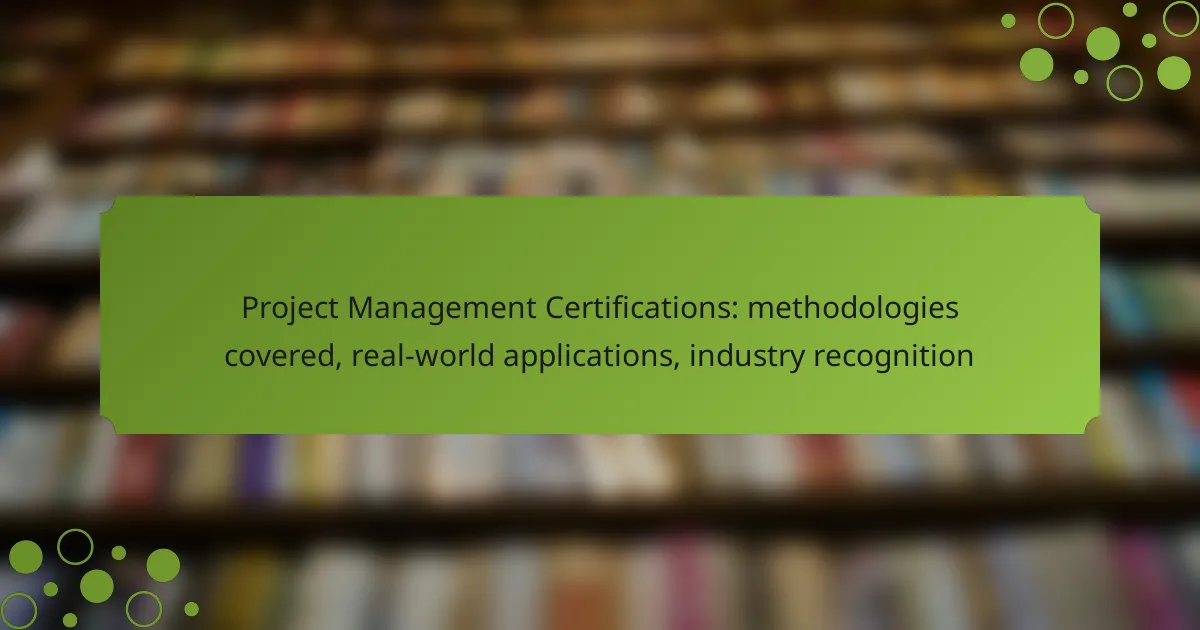
Project management certifications are essential for professionals seeking to validate their expertise and enhance their career prospects in a competitive job market. These certifications cover a variety of methodologies, such as Agile, Waterfall, Lean, and Scrum, providing practitioners with the tools needed to manage diverse projects effectively. Recognized globally, they not only signify a commitment to the profession but also align with industry standards, opening doors to better job opportunities and career advancement.

What are the best project management certifications?
The best project management certifications enhance skills, improve career prospects, and validate expertise in various methodologies. They are recognized globally and cater to different project management approaches, making them valuable for professionals across industries.
Project Management Professional (PMP)
The Project Management Professional (PMP) certification is one of the most recognized credentials in project management. It demonstrates a thorough understanding of project management principles and practices, covering areas such as scope, time, cost, quality, and risk management.
To obtain PMP certification, candidates must meet specific educational and professional experience requirements, followed by passing a rigorous exam. This certification is ideal for those looking to advance their careers in project management and is often a prerequisite for senior roles.
Certified ScrumMaster (CSM)
The Certified ScrumMaster (CSM) certification focuses on the Scrum framework, which is widely used in agile project management. It equips professionals with the knowledge to facilitate Scrum teams and ensure effective implementation of agile practices.
To earn the CSM, candidates must attend a two-day training course and pass an exam. This certification is particularly beneficial for those working in software development or industries that prioritize flexibility and rapid delivery.
PRINCE2 Certification
PRINCE2 (Projects IN Controlled Environments) certification is a structured project management method widely used in the UK and internationally. It emphasizes organization, control, and quality throughout the project lifecycle.
There are two main levels: PRINCE2 Foundation and PRINCE2 Practitioner. Candidates can pursue these certifications through training courses and exams, making it suitable for those seeking a systematic approach to project management.
Lean Six Sigma Certification
Lean Six Sigma certification combines Lean manufacturing principles with Six Sigma methodologies to improve process efficiency and quality. This certification is ideal for professionals aiming to reduce waste and enhance operational performance.
Lean Six Sigma offers various levels, including Yellow Belt, Green Belt, and Black Belt, each requiring different levels of training and project experience. It is applicable across various industries, including manufacturing, healthcare, and finance.
Agile Certified Practitioner (PMI-ACP)
The Agile Certified Practitioner (PMI-ACP) certification recognizes knowledge of agile principles and practices. It is designed for project managers who work in agile environments and want to demonstrate their expertise in agile methodologies.
To achieve PMI-ACP certification, candidates must have experience working on agile teams and pass an exam. This certification is beneficial for professionals in industries that require adaptability and quick responses to change.

How do project management certifications enhance career prospects?
Project management certifications significantly enhance career prospects by validating skills and knowledge in managing projects effectively. They demonstrate to employers a commitment to the profession and an understanding of industry standards, which can lead to better job opportunities and career growth.
Increased job opportunities
Holding a project management certification can open doors to a wider range of job opportunities across various industries. Employers often prefer candidates with recognized certifications, as they indicate a proven ability to manage projects successfully. This preference can be particularly strong in sectors like IT, construction, and healthcare.
For example, certifications such as PMP (Project Management Professional) or PRINCE2 are highly regarded and can make candidates more competitive in the job market. Many organizations actively seek certified professionals to fill project management roles, increasing the likelihood of securing interviews and job offers.
Higher salary potential
Certified project managers typically enjoy higher salary potential compared to their non-certified peers. Studies indicate that professionals with certifications can earn salaries that are often tens of percent higher, depending on the industry and location. For instance, in the United States, certified project managers can earn upwards of $100,000 annually, while those without certifications may earn significantly less.
Additionally, certifications can lead to bonuses and other financial incentives, further enhancing overall compensation. Employers recognize the value that certified project managers bring to their organizations, which can translate into better financial rewards.
Career advancement
Project management certifications can accelerate career advancement by equipping professionals with essential skills and knowledge that are applicable to leadership roles. As organizations increasingly rely on effective project management for success, certified individuals are often considered for promotions and leadership positions.
Moreover, certifications can serve as a stepping stone to advanced roles, such as program manager or portfolio manager. By demonstrating a commitment to professional development and mastery of project management methodologies, certified professionals can position themselves as valuable assets to their organizations, paving the way for long-term career growth.

What methodologies are covered in project management certifications?
Project management certifications typically cover a range of methodologies that equip professionals with the skills to manage projects effectively. Key methodologies include Agile, Waterfall, Lean, and Scrum, each offering distinct approaches suited for different project types and environments.
Agile methodologies
Agile methodologies focus on iterative development and flexibility, allowing teams to adapt to changes quickly. This approach is particularly beneficial in dynamic environments where requirements may evolve throughout the project lifecycle.
Common Agile frameworks include Kanban and Extreme Programming (XP), which emphasize collaboration and customer feedback. Teams often work in short cycles, known as sprints, to deliver incremental value.
Waterfall methodology
The Waterfall methodology is a linear and sequential approach to project management. It involves distinct phases such as requirements gathering, design, implementation, testing, and maintenance, where each phase must be completed before the next begins.
This methodology is effective for projects with well-defined requirements and minimal expected changes, such as construction or manufacturing projects. However, it can be inflexible if changes are needed after the project has started.
Lean principles
Lean principles aim to maximize value while minimizing waste in project processes. This methodology encourages continuous improvement and efficiency by focusing on delivering only what the customer needs.
Common practices include value stream mapping and eliminating non-value-added activities. Lean is often applied in manufacturing but can also be adapted for service industries to streamline operations and enhance customer satisfaction.
Scrum framework
The Scrum framework is a subset of Agile that organizes work into small, manageable units called sprints, typically lasting two to four weeks. Scrum emphasizes teamwork, accountability, and iterative progress toward a well-defined goal.
Key roles in Scrum include the Product Owner, Scrum Master, and Development Team, each with specific responsibilities. Regular ceremonies such as daily stand-ups and sprint reviews facilitate communication and ensure alignment among team members.

What are the real-world applications of project management certifications?
Project management certifications are widely applicable across various industries, enhancing professionals’ skills and credibility. They provide frameworks and methodologies that help in effectively managing projects, ensuring successful outcomes in diverse settings.
Implementation in IT projects
In IT projects, project management certifications like PMP or Agile methodologies are crucial for managing software development, system implementations, and technology upgrades. These certifications equip professionals with skills to handle project scope, timelines, and stakeholder communication effectively.
For instance, Agile certifications focus on iterative development and flexibility, which are essential in fast-paced IT environments. Utilizing these methodologies can lead to improved project delivery times and higher customer satisfaction.
Application in construction management
In construction management, certifications such as the Certified Construction Manager (CCM) help professionals oversee complex projects, ensuring adherence to safety regulations and budget constraints. These certifications provide knowledge on risk management, resource allocation, and compliance with local building codes.
For example, a project manager with a CCM certification can effectively coordinate between contractors and stakeholders, minimizing delays and cost overruns. Understanding the construction lifecycle is vital for timely project completion and quality assurance.
Use in healthcare project management
Healthcare project management certifications, such as the Project Management Professional (PMP) or specific healthcare-focused credentials, are essential for managing projects in hospitals and clinics. These certifications help professionals navigate regulatory requirements and improve patient care through efficient project execution.
For instance, implementing a new electronic health record system requires careful planning and execution, where certified project managers can ensure that the project meets both technical specifications and compliance standards. Effective communication among healthcare teams is also enhanced through structured project management practices.

How is industry recognition achieved through certifications?
Industry recognition through certifications is achieved by demonstrating proficiency in established methodologies and practices that are widely accepted in the field. Certifications like PMP and CSM signal to employers and clients that an individual possesses the necessary skills and knowledge to manage projects effectively.
Global recognition of PMP
The Project Management Professional (PMP) certification is recognized worldwide as a standard for project management excellence. It is governed by the Project Management Institute (PMI), which sets rigorous standards for certification, ensuring that PMP holders are well-versed in various project management methodologies.
PMP certification is often a requirement for project management roles in many industries, including IT, construction, and healthcare. Organizations across the globe seek PMP-certified professionals to enhance their project success rates and ensure adherence to best practices.
Employer endorsement of CSM
The Certified ScrumMaster (CSM) certification is endorsed by employers who value Agile methodologies in project management. This certification, offered by the Scrum Alliance, focuses on the principles of Scrum and Agile project management, making it particularly relevant in fast-paced environments.
Employers often prefer CSM-certified candidates for roles in software development and product management, where Agile practices are prevalent. The endorsement signifies that the individual can facilitate Scrum processes and lead teams effectively, enhancing overall project delivery.
Industry standards compliance
Certifications like PMP and CSM help professionals comply with industry standards and best practices. These certifications align with frameworks such as PMBOK (Project Management Body of Knowledge) and Agile methodologies, ensuring that certified individuals are equipped to meet regulatory and organizational requirements.
Compliance with these standards not only enhances project outcomes but also fosters trust among stakeholders. Organizations that employ certified professionals often experience improved project performance and higher stakeholder satisfaction, making these certifications valuable assets in the competitive job market.

What are the prerequisites for project management certifications?
Prerequisites for project management certifications vary by certification type but generally include a combination of education, experience, and sometimes specific training. Most certifications require a foundational understanding of project management principles and practices.
Educational Requirements
Many project management certifications necessitate a minimum level of education, often a high school diploma or a bachelor’s degree. For instance, the Project Management Professional (PMP) certification from the Project Management Institute (PMI) requires a four-year degree along with several years of project management experience.
Experience Requirements
Experience is a critical factor in qualifying for project management certifications. Candidates typically need to demonstrate a certain number of hours leading and directing projects. For example, PMP candidates must have at least 4,500 hours of project leadership experience if they hold a four-year degree.
Training and Exam Preparation
Some certifications require formal training or completion of specific courses before taking the exam. For instance, the Certified ScrumMaster (CSM) certification requires attending a two-day training course. It’s advisable to review the specific training requirements for each certification to ensure adequate preparation.


